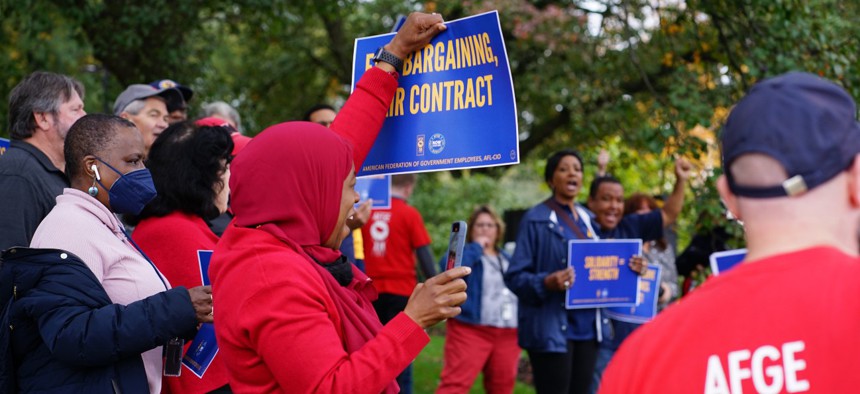
Social Security Administration employees rally on Oct. 26, 2022 at the agency’s headquarters in Baltimore. Chelsea Bland / AFGE
OPM to Agencies: Make Sure You Haven’t Incorrectly Told Employees They Can’t Join a Union
The directive is aimed at correcting instances where employees were improperly labeled as management officials.
The Office of Personnel Management on Thursday said that agencies need to conduct audits of their workforces to ensure that none of their employees have been improperly deemed ineligible to be represented by a union.
Guidance published Thursday provides instructions for agencies to comply with a 2022 recommendation from the White House Task Force on Worker Organizing and Empowerment, suggesting that OPM work with agencies to review and update past decisions about which positions should be excluded from bargaining units.
“One federal sector recommendation is to address whether employees encumbering non-bargaining unit positions are correctly excluded from bargaining unit coverage,” OPM wrote. “Specifically, the task force notes that OPM should work with agencies and provide guidance to help them review and, if necessary, correct the bargaining unit status of federal sector employees encumbering such positions.”
Officials encouraged agencies to work together with their unions to undertake the audits and seek approval for reclassifying positions that were excluded from union representation to become part of a bargaining unit.
“Agencies should work with any unions that represent other employees in the organization to correct, if necessary, the bargaining unit status of federal sector employees who encumber positions which have been excluded from bargaining unit coverage,” the guidance stated. “[If] there are questions on the appropriate bargaining unit status, agencies and unions are strongly encouraged to jointly request assistance from the [Federal Labor Relations] Authority. The authority has the responsibility for making bargaining unit determinations.”
Before commencing a review of employees’ bargaining unit status, agencies should review the FLRA’s summary of caselaw governing bargaining unit determinations, OPM wrote. Once an audit has been completed, agencies and unions should jointly file petitions requesting any changes to employees’ bargaining unit status before the FLRA.
“Agencies and unions may file petitions requesting clarification of existing bargaining units in their efforts to address inclusion and exclusion of positions,” OPM wrote. “[Agencies] and unions are strongly encouraged to work together on identifying which positions should be included or excluded from bargaining units and consider filing a joint petition to the FLRA.”
The guidance also highlighted a possible new wrinkle in determining whether a federal employee should be eligible to join a union: remote work. Oftentimes, union eligibility includes geography as a component, meaning that the expanding use of remote work agreements could impact remote employees’ bargaining unit status.
OPM officials warned that language addressing the geography of a bargaining unit should not necessarily be the sole reason for excluding an employee from being able to join or be represented by a union.
“Bargaining unit certifications often describe bargaining units in terms of organization and geography,” OPM wrote. “Over the last several years, more and more employees are becoming remote workers, raising questions of continued bargaining unit coverage once an employee moves to a different geographic area while remaining in the same organization . . . The employee may properly be within the bargaining unit, but the language of the certification is only one factor for the parties to consider.”







